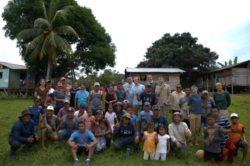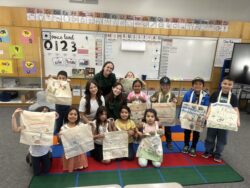UC Santa Barbara is a nationally recognized university for its diverse programs and initiatives, but what many people may not know is that it ranks as the seventh most sustainable university in the world, according to Sustainability Magazine.
This ranking is a culmination of many factors, including the university’s effort to promote renewable energy, its numerous Leadership in Energy and Environmental Design (LEED) buildings, the university’s water conservation initiatives and most importantly, the numerous student organizations that help enact environmental change locally, nationally and globally. From educating future environmental scientists to building rainwater catchment systems in Rwanda, these student-led organizations are at the heart of UCSB’s sustainability efforts.

SARAH CAULDER / DAILY NEXUS
Gauchos Go Green:
Gauchos Go Green is a sustainability club focused on improving environmental efforts throughout the Isla Vista and Santa Barbara area by increasing eco-friendly practices. Gauchos Go Green was originally called “Greeks Go Green,” with a focus on turning fraternity and sorority chapter houses into green businesses. This title, which is only awarded to organizations that go through an extensive, ongoing green certification process, has been a main goal of the organization.
Efforts to help Greek chapter houses achieve their sustainable business certification have flourished as in 2022, UCSB’s Kappa Alpha Theta sorority chapter became the first green certified Greek chapter house in California.
Now, the club is looking to expand their efforts to the entire Santa Barbara community, hence the name change to “Gauchos Go Green.” They continue to help local restaurants and clothing stores work towards their own green certifications, acting as liaisons between the county and local establishments.
Additionally, Gauchos Go Green hosts a variety of sustainability-based events and competitions. One past competition focused on water conservation called the Faucet Faceoff where different houses competed to lower their water bill the most. On their Instagram page, @ucsbgauchosgogreen, you can find information about events as well as sign up for future competitions. They also host recycling initiative events for students and do weekly Isla Vista street cleanups. Other events hosted by the club include band parties, food fundraisers and educational guest lectures and panels, and they even own a community garden plot that is maintained by students.
Gauchos Go Green President and fourth-year political science major Mira Becker urges students that are interested in sustainability to get involved.
“You don’t need any prior experience,” Becker said. “We make getting involved in sustainability really approachable and creative so anyone who’s interested can find their place in the environmental community here in Santa Barbara.”
Becker emphasized that sustainability is not a one-size-fits-all approach, and a diverse range of students, majors and efforts are needed to successfully enact change. “It can be really hard and overwhelming to make a difference all on your own, so finding a like-minded group of people will allow you to bounce ideas off of each other and can provide the resources to really make something happen,” Becker said.
If you are passionate about the environment, improving your own community or you just have the urge to spark change, don’t hesitate to find your place and make an impact with Gauchos Go Green.
Engineers Without Borders:
UCSB’s Engineers Without Borders’ (EWB-USA) chapter is part of a nationally recognized organization. Their main goal is to help communities around the world sustainably meet their basic human needs using environmentally-friendly engineering solutions. The club follows a project-based model, allowing students to collaborate on real-world engineering challenges from the initial design to implementation stages.

COURTESY OF UCSB ENGINEERS WITHOUT BORDERS
At UCSB, their two main projects are located in Ngoma, Rwanda and Valle Escondido, Panama. Their Rwanda project, first started in 2022, focuses on installing water catching systems with functioning tap stands and distribution pipes. The previous water system was contaminated with coliform bacteria, leading to high rates of illness in the community. The community in Ngoma also experienced problems with their wells drying up during the hotter months.
To help combat these problems in the community, engineers from EWB-USA work hand-in-hand with community members to gather resources and install fully functional rainwater catchment systems during implementation trips. They also worked with local engineers to create a biosand filtration system to help clean the water for the community, complete with tap stands and extensive water storing facilities.
In Panama, EWB-USA works towards a similar goal. Currently, the project is split into two distinct phases. During their first implementation trip in September of 2024, EWB-USA engineers and community members installed 40,000 liters of water storage, replaced mainline pipes and added an inline chlorine water treatment system. In their second implementation project, aimed to start this September, they hope to install additional water storage and continue to expand the local pipe system.
“We work one on one with the community in a partnership. The whole community gets involved in helping, including the children, elders and adults,” President of the UCSB chapter Morgan Parslow said. Students rely heavily on locals for guidance as both help design and install these structures. In addition to local communities, the club also works with UCSB alumni to communicate with the Floating Doctors that organize and advocate for communities interested in the program.
Parslow emphasized that it’s “Engineers Without Borders but not really, any major can join, everyone can have a place.” The projects require a diverse group of people beyond just engineering majors, with backgrounds in all different disciplines and majors. She says that if you are passionate about the mission of the club, there is a spot for you, no matter your previous background and experiences.
Sprout Up:
Sprout Up is an outreach organization at UCSB that focuses on environmental education in elementary schools throughout the community. As part of a larger organization made up of chapters across the country, volunteers teach lessons once a week focusing on local ecosystems and issues.
“Our biggest impact is fostering a love for nature and the outdoors. We aim to reduce eco-anxiety in today’s world by using fun, engaging activities that help children connect with the environment,” Chapter Co-Director and second-year environmental studies and geography double major Peyton Stoller said.
Lessons often incorporate interactive and creative elements such as decorating reusable tote bags or planting seeds. In a unit on water conservation, students share their experiences on local beaches and create posters to highlight the issue.
“This [topic] resonates deeply in Santa Barbara, where water conservation is critical due to our coastal location,” Stoller said.
The UCSB chapter was originally founded in 2009 to help combat the lack of environmental education in public schools. The Santa Barbara chapter teaches lessons in combined first- and second-grade classrooms and is expanding into fourth grade as well. The program runs for eight weeks each quarter with weekly general meetings to discuss progress, outreach and updates.

COURTESY OF UCSB SPROUT UP
Sprout Up is open to all UCSB undergraduates and welcomes new members to join their cause at the beginning of each quarter.
“One of my favorite aspects is the diverse community we’ve built,” Stoller said.
According to Stoller, Sprout Up is always planning new outreach opportunities to spread their message of environmental sustainability and education, including a 5K run fundraiser this spring quarter.
“If you’re passionate about the environment and want to work with kids, we’d love for you to join us,” Stoller said.
Butterfly Conservation Club:
The Butterfly Conservation Club was established at UCSB in Fall 2024 to focus on protecting butterflies in the community. Their efforts include expanding habitats, tending to existing pollinator gardens and planting eucalyptus trees for monarch butterflies to use during hibernation.
“We have a special emphasis on monarch butterflies and swallowtail butterflies because they are very affected by urban development,” club founder and President and fourth-year classics and communication double major Isabella Walker said.
Butterflies in the area have been dying out as global climate change, pesticides and urban development destroy their natural habitats. When Walker noticed that there had been a decrease in the species she had always had an affinity for, she was inspired to make a difference.
Last winter, a significant number of eucalyptus were cut down in the city of Goleta.
“When the butterflies migrate they are confused [because] the trees they have been going to for 50 or 100 years are gone. So by planting more trees in the spots where there should be trees and they will grow, then that will help with [the monarchs’] familiarity and with coming back every single winter, ” Walker said.
The club’s efforts focus on the Goleta Monarch Butterfly Grove at Ellwood Mesa located approximately 10 minutes from campus and on the garden plots at the Greenhouse Garden Project through UCSB. Every month they host gardening events where they plant important species that help attract and sustain butterfly populations, such as milkweed. Members also participate in a daily weeding and watering schedule to help maintain their garden plots.
The club encourages all students to sign up and participate. Members come from different levels of experience, and whether through digging, weeding or planting flowers, there is a place for everyone.
While their efforts focus on sustainability, the club also provides meaningful social interactions.
“Gardening is all about connecting with other people,” Walker said.
She notes that many members have noticed that unplugging from their phones and spending an afternoon connecting with others in nature has helped their overall mental health.
After graduating Walker hopes to eventually return to Goleta as an attorney and continue her work in protecting the environment.
“I love contributing and being part of something greater than me,” Walker said. “What’s cool about these trees is that they’ll live past my lifetime.”
UCSB’s sustainability efforts are vast and diverse, with clubs relating to every aspect of environmental efforts and student interests. Whether you want to help educate students, build water pipes in Africa, certify green businesses or increase populations of native species, there is always a place for you in the environmental community at UCSB.
A version of this article appeared on p.10 of the Apr. 15, 2025 edition of the Daily Nexus.





















In re: the environment–Sable Oil
I am still in a quandary as to when Attorney General Rob Bonta will finally weigh-in on this ongoing legal embroglio. One cannot sit on the fence forever in this matter when there exists a plethora of potential environmental dangers present. I sincerely respect his need for an adequate amount of due deliberation, but the time has finally come to act–and most emphatically, now. His continued reticence obviously shows to the people of California his true colors here.
I just finished reading the latest Nexus article on Sable. Kudos to Rob Bonta! Keep up the great effort(s)! Will be following the latest developments in earnest.